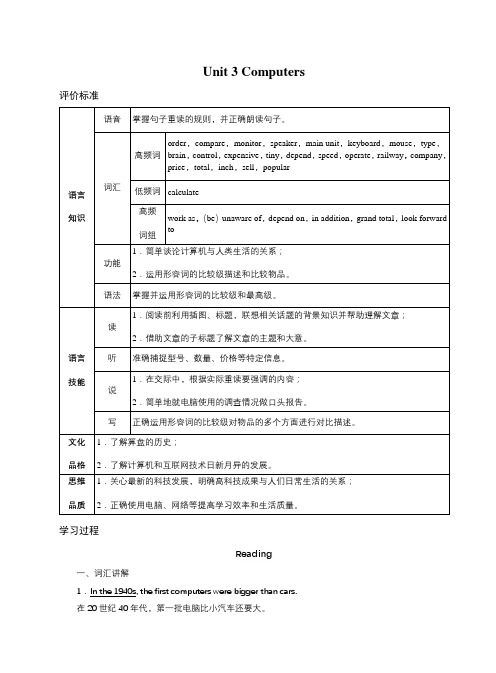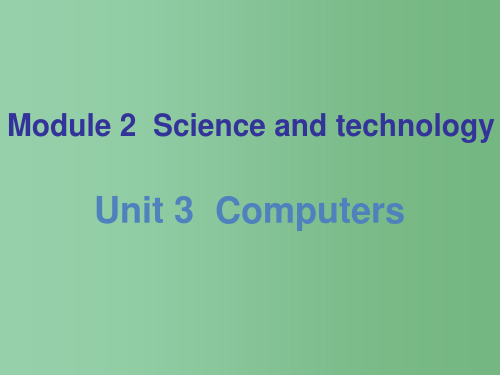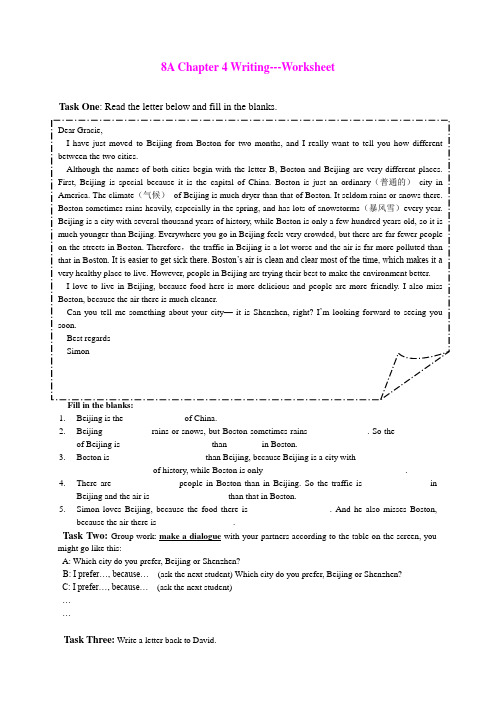八年级英语上module 3 computers and the internet
- 格式:doc
- 大小:56.00 KB
- 文档页数:8


Unit 3 Computers 评价标准学习过程Reading一、词汇讲解1.In the 1940s, the first computers were bigger than cars.在20世纪40年代,第一批电脑比小汽车还要大。
in the 1940s意思是“在20世纪40年代”,它还可以表示为in the 1940’s。
同样地,“在19世纪70年代”可以写为in the 1870s。
2.You may be unaware of them. 你可能没有察觉到他们。
unaware,形容词,“没意识到;未察觉”的意思,常用的搭配有be unaware of sth.。
unaware是由词缀un-和aware构成。
aware,形容词,“察觉到;发觉”的意思。
e. g. At that moment, many people were unaware of the coming of the earthquake. 在那时,很多人都没有意识到地震即将到来。
3.In addition, computer can do important jobs like operating railways and flying planes and spaceships.此外,电脑能做重要的工作,例如控制铁路、操纵飞机和飞船。
(1)in addition意思是“除……以外(还)”,用于句首时,其后常用逗号与句子分隔。
e. g. In addition, students can use computers in the library.此外,学生能在图书馆使用电脑。
(2)like,介词,意思是“例如;比方”,常用于举例。
e. g. I love doing sports like playing basketball and football.我喜欢做运动,如打篮球和足球。
二、经典句解析You depend on computers more than you realize.你对电脑的依赖比你意识到的要大。


8A Chapter 4 Writing---WorksheetTask One: Read the letter below and fill in the blanks.Dear Gracie,I have just moved to Beijing from Boston for two months, and I really want to tell you how different between the two cities.Although the names of both cities begin with the letter B, Boston and Beijing are very different places. First, Beijing is special because it is the capital of China. Boston is just an ordinary(普通的)city in America. The climate(气候)of Beijing is much dryer than that of Boston. It seldom rains or snows there. Boston sometimes rains heavily, especially in the spring, and has lots of snowstorms(暴风雪)every year. Beijing is a city with several thousand years of history, while Boston is only a few hundred years old, so it is much younger than Beijing. Everywhere you go in Beijing feels very crowded, but there are far fewer people on the streets in Boston. Therefore,the traffic in Beijing is a lot worse and the air is far more polluted than that in Bo ston. It is easier to get sick there. Boston’s air is clean and clear most of the time, which makes it a very healthy place to live. However, people in Beijing are trying their best to make the environment better.I love to live in Beijing, because food here is more delicious and people are more friendly. I also miss Boston, because the air there is much cleaner.Can you tell me something about your city—it is Shenzhen, right? I’m looking forward to seeing you soon.Best regardsSimonFill in the blanks:1.Beijing is the _____________ of China.2.Beijing __________ rains or snows, but Boston sometimes rains _____________. So the _________of Beijing is ________ __________ than _______ in Boston.3.Boston is _____________________ than Beijing, because Beijing is a city with ___________________________________ of history, while Boston is only ________________________________.4.There are ______________ people in Boston than in Beijing. So the traffic is ______________ inBeijing and the air is _________________ than that in Boston.5.Simon loves Beijing, because the food there is __________________. And he also misses Boston,because the air there is _________________.Task Two: Group work: make a dialogue with your partners according to the table on the screen, you might go like this:A: Which city do you prefer, Beijing or Shenzhen?B: I prefer…, because…(ask the next student) Which city do you prefer, Beijing or Shenzhen?C: I prefer…, because…(ask the next student)……Task Three:Write a letter back to David.1. Writing timeDear Simon,Thanks for your letter about your opinion on the two cities. I’d like to tell you the differen ces between my city and Beijing.Beijing is in _____________________ of China, and Shenzhen is in ________. Since Beijing is the _____________ of China, it’s ______________ than Shenzhen. Beijing is a city ____________________ __________________, while Sh enzhen is __________________, so it’s _______________ than Beijing. It _________________ in Beijing, but Shenzhen sometimes has typhoon. So the ____________ of Beijing is ______________ than that in Shenzhen, and in winter Shenzhen is _______________ .______________________________________________________________________________________ ______________________________________________________________________________________ ______________________________________________________________________________________ ______________________________________________________________________________________ ______________________________________________________________________________________ ______________________________________________________________________________________ I really love ____________, because ______________________________________________________ ______________________________________________________________________________________Welcome to my city—Shenzhen!Best wishes___________I think ________ has done a(n) _________ job. He can get ______ points. Because his/her handwriting is ____, he loses _____ point(s). There are ____ mistakes in his writing. First, ________ should be _________. Second, …. So he loses_____ points. In his writing I think this sentence is excellent:______________________________.Thank you for listening!。


牛津深圳版英语八上Unit 3《Computers》单元说课稿一. 教材分析《牛津深圳版英语八上Unit 3 Computers》这一单元的主题是计算机,内容涉及计算机的历史、计算机的硬件和软件、计算机的用途等。
教材通过丰富的语言材料,引导学生了解计算机的发展历程,掌握计算机的基本知识,提高运用英语进行交流的能力。
二. 学情分析根据我对学生的了解,他们在学习这一单元时,可能对计算机的历史有一定的陌生感,但对计算机的硬件和软件、计算机的用途等方面的知识有一定的了解。
因此,在教学过程中,我需要帮助学生复习和巩固已有的知识,同时引导学生运用英语进行交流。
三. 说教学目标1.知识目标:学生能够掌握计算机的基本知识,包括计算机的历史、硬件和软件、用途等。
2.能力目标:学生能够运用英语进行有关计算机的对话交流,提高听、说、读、写的综合能力。
3.情感目标:学生能够培养对计算机的兴趣,提高学习英语的积极性。
四. 说教学重难点1.重点:学生能够掌握有关计算机的词汇和句型,能够用英语进行简单的对话交流。
2.难点:学生能够运用所学知识,就计算机的话题进行较深入的讨论和交流。
五. 说教学方法与手段在教学过程中,我将采用任务型教学法,通过各种任务活动,引导学生参与学习,提高他们的学习兴趣和积极性。
同时,我还将运用多媒体教学手段,如课件、视频等,帮助学生更好地理解和掌握知识。
六. 说教学过程1.导入:通过提问方式,引导学生谈论他们所了解的计算机,激发学生的学习兴趣。
2.呈现:通过课件或视频,展示有关计算机的历史、硬件和软件、用途等方面的知识,帮助学生复习和巩固已有的知识。
3.实践:学生分组进行讨论,用英语讨论计算机的用途和他们的计算机使用经历,引导学生运用英语进行交流。
4.输出:学生进行角色扮演,模拟计算机店的情景,运用所学知识进行对话交流。
5.复习:通过各种练习活动,帮助学生巩固所学知识。
七. 说板书设计板书设计将包括课题《Computers》、本节课的主要词汇和句型,以及课堂活动的步骤和任务。
授课设计2课题Unit3Computers课型Reading备课时间1period1.Knowmoreaboutthedevelopmentofcomputers,andthebasicuse教授课目标ofcomputers2.Developthereadingabilityandspeakingskills 材分授课重点Letstudentsknowtheuseofcomput ers析授课难点Thehistoryofcomputersanddothecomparisonbetweencomputersan dhumanbrains授课重点Knowdifferentpartsofcomputersandthefunctions ofthem教法与学法指导Readingcompetition,cooperatio n,self-study.主要授课步骤或内容学生主体活动教师活动设计妄图时间分派Stepone:Freetalk:1.Accordingtothe 1.ShowsomeToarousethe5 pictures,guesssomepicturesandletinterestandlead1.Guessinggameappliancesusedinstudentsguessthemtogetinto2 .Knowallthecomponentsofa dailyusethetopicof thiscomputer2.Knowthe2.Askthemtopay unit.compositionof wordsattentiontot heofeachpartoft hepronunciatio n.computer,pay attentiontothe correctspelling. Knowthefunctionof eachpartSteptwo:fastreading(Bef oreyouread)1.Lookatthetitle, 1.Showthe1.Letthestuden ts25sub-headingsandpictures question getthegeneralandthentic k(√)theAndcheaktheideaofthetext..factsthatthearticle answers.probablytalksabout.Stepthree:while-reading.Readingcomprehension.Stepfour:post-reading.1.ReadthefirstpartofthearticleandGuidestudentstocompletethetableanswerquestions.belowPayattentiontoTomakethemget 2.Readthesecondpartsomekeywordsfamiliarwiththeofthearticlea ndandphrasesofdetailsofthetextcompletethetable thisunit:andtrainth eirbelowdependon,moreabilityofreading3 .Readthethirdpartthan,faste r,ofthearticleand cleverer answerthequestionsRetellthearticl eLeadthestudentsLetstudentsaccordingtotheo utlinetoretellthetextfurtherunderstandontheblackboard correctlythearticl eStepfive:practiceFinishtheexercise Helpthemto Totraintheintheguidingpaperfindtheanswersstudents’readingandexplainthe ability.new words.Stepsix:Debatecompetiti onDividethestudentsintoGuidestudentstoCultivating twogroupstodebatethe correctlystudents' advantagesandunderstandtheusecooperative disadvantagesofthe ofcomputersinquiryability computerStepseven:summaryStudentsunderstandtheGuidethestudentsConsolidatetheuseofcomputerstoreviewthekeyknowledgelearnedknowledgeoftheinthislessonlessonHomework WriteanarticleInstructstudentsStrengthentheH owtousethehowtoexpresscomprehensionofcom puterscorrectlytheirviewsby thetext.i n ourdailylives?usingwhattheyhavelearned课堂教Freetalk---Fastreading---while-reading-----post-reading—practice学—discussion--summary--homework.流程效果评价与反思5 5part1:Thesizes ofcomputersindifferenttimes.biggerthancarssmallerandbetter板书设Computerpart2:The usesofcomputersCalculateType anddraw thingsDoimportant jobsindailylife.计Part3:Therelationship betweenhumanbeingsandcomputersinthefuture.Produce new ideas Do a better job。
一. 教学内容:Module 3 Computers and the Internet二. 教学重点、难点:1. 一般将来时will的用法,用will来礼貌地表达某一请求。
2. 熟练灵活而准确地掌握本模块的“重点词汇及句型”3. 能阅读有关将来活动的问答和有关在网上进行信息搜索的英语说明。
三. 语法:写作指导,how to write e-mail.1. 在标题栏(heading)上“收件人(to)”框中输入收件人的e-mail地址。
“主题(subject)”框内的内容应简明地概括信的内容。
2. e-mail的写作一般采用非正式文体,因为(body)正文前的称呼(salutation)通常不使用诸如“dear Mr. John”之类的表达。
3. e-mail文体的另一个特点是简洁明了。
如内容较长,则应以附件的形式发出。
信尾客套话通常也应简明,如:thanks/best/cheers等。
4. 必须根据提示,将要点写全,并注意语言的运用。
经典范例:air France(法国航空公司)最近推出特别优惠机票网上订票活动。
假如你在一周后要去Paris,请你以e-mail的形式向本地air France办事处(bookoffice. zj@airfrance. fr)预订一张机票。
并在你的邮件的相关地方写清楚如下内容:1、订下周一上午10点飞往巴黎的机票一张;2、现在住建国宾馆(Jian Guo guest house)805房间;3、希望三天后把机票送往住处;4、联系电话是86762002。
注意事项:1、正文开头部分已写好,只需接着写;2、可适当增加细节,使所写内容连贯;3、词数:70个左右。
收件人:__________________________主题:__________________________主要内容:dear sir,I____________________________________________________________________________ _________________________________________________________________________________ _________________________________________________________________________________ _________________________________四. 词和短语:本模块围绕“电脑与互联网”这个话题,现将有关此话题的“词和短语及句子”总结如下:(一)1. the computer room. 电脑室。
2. on the internet. 在互联网上。
3. send emails to them=send them emails. 给他们发送email。
4. switch on the computers. 打开电脑。
5. press this button. 按这个按钮。
6. click on the ‘Enter’ sign. 点击“enter”标识。
7. it’s not doing anything. 它不好使(它没有反应)。
8. click on ‘find an epal’. 点击“寻找网友”。
9. fill in the form. 填表格。
10. read about epals on the page. 读这一页上的关于网友的信息。
11. choose one person that you want to write to. 选择一个你想给其写信的人。
12. click on ‘send’ when finish. 结束后点击“发送”。
13. search the Internet for information. 搜寻互联网查找信息。
14. read stories sitting at a computer. 坐在电脑前读故事。
15. lots of good websites. 许多好网站。
(二)1. Make friends with some British children. 和一些英国孩子交朋友。
2. in your spare time 在你的业余时间里3. the same age as you 和你一样大4. be able to do 能做……5. write back to sb. 给某人写回信6. Any more questions? 还有什么问题?7. Maybe. 也许,大概。
8. play computer games with sb. 和某人玩电脑游戏9. help you with the homework 帮助你做作业10. Be quiet. 保持安静。
11. Let me try. 让我试一试。
12. Do an exercise. 做一道练习。
13. Carry too many books. 搬太多本书。
14. Want her to meet you. 想让她来见你。
15. Talk too loudly. 太大声的交谈。
16. a pair of sports shoes 一双运动鞋17. watch the football match 看足球比赛18. on which day 在哪一天19. have an English test 进行英语测试20. next period 下节课21. send letters by post 通过邮递发送信件22. play outside 在外边玩23. look for information on the internet 在互联网上寻找信息24. email people 给人发email五. 重点句式的讲解与分析1. I’ll find you some nice books. 我将给你找一些好的书。
find you some nice books=find some nice books for you.<扩展>这种结构在英语语法中称之为双宾语,一般分两大类:第一类:“vt+sb.+sth.”=“vt+sth.+to sb.”其中vt为及物动词,sth.为直接宾语,sb.为间接宾语,能这样接双宾语的及物动词有“七给”(give, pass, lend, write, show, send, hand)和一带“bring”等。
如:please give me the book=please give the book to me第二类“vt+sb.+sth.”可转化为“vt+sth.+for+sb.”能这样接双宾语的及物动词有draw (画),make(制作),buy(买),cook(做饭),sing(唱歌)等。
如:My mother bought me a new bike yesterday.=My mother bought a new bike for me yesterday.注:当直接宾语为代词时,必须用“vt+sth.+to/for+sb.”结构。
如:Please give it to Lucy. 请把它给露西。
Who made it for you?谁给你做的?2. Will everyone be quiet, please?请大家安静,好吗?此句表达更加委婉。
<扩展>注意please的位置,句中、句后,如:Will you please sit down?=Will you sit down, please?3. I can’t switch this computer on. 我不能打开这个电脑。
switch sth. on或switch on sth. 注意:当sth.是名词时是句中、名后,sth.是代词时必须位于中间,如:switch this computer on=switch on this computer switch it on<扩展>当动词+副词构成的短语时,都符合上面的原则,如:put on, turn down/up, take off (脱下),switch on/off打开(关上)开关,click on点击,work out算出来,take out拿出来当动词+介词构成的短语时,当sth.是名词或代词时,必须放在其后。
如:look after照顾,think about考虑,look for寻找,look at看着……注意:work on从事于,get on/off上(下)车,当sth.是代词时必须放在最后。
4. you’ll be able to see them soon. 不久你将能看见他们。
be able to v. 能,会做某事。
<扩展>can与be able to的区别。
be able to有人称和时态的变化,如:He is able to swim. He will be able to swim. He was able to swim.can是情态动词,它没有人称和时态(过去时除外)的变化。
如:He can swim. He could swim in the past.【典型例题】1. He ______right.A. mayB. maybeC. may be分析:此题考查的是may, maybe, may be的区别:may情态动词表示“可能,可以”后+v原。
“maybe”副词“也许,大概”可位于句首,也可位于助后动前,may be是两个词“可能是”。
故选择C。
2. May I ask you _______ questions?A. any moreB. some moreC. another more分析:some more, any more“再一些,另外一些”some more用在肯定句,any more用在疑问句,some more用在疑问句中表示希望得到肯定回答。
故选择B。
3. You don’t know how to do an__________A. exerciseB. exercises分析:此题考查的是exercise的用法,exercise作可数名词时,意思为“练习题,操”如:do morning exercises,exercise作不可数名词时,意为“锻炼”do exercise。
故选择A。
【模拟试题】(答题时间:45分钟)一. 单项选择。
1. ()I’ll make friends _____ some British boys.A. toB. withC. ofD. from2. ()W e’ll ______ emails to my Internet friends in Japan.A. getB. bringC. sendD. receive3. ()I don’t know ______ he does there.A. howB. whereC. whatD. which4. ()He is studying English ____ the Internet.A. onB. inC. atD. of5. ()Will they have a new mobile phone______?A. everyB. eachC. bothD. all6. ()Do you have ______ questions, Li Ping?A. aB. muchC. any moreD. more many7. ()I don’t get __ email from my friends . What about you?A. aB. theC. anD. /8. ()Stop _____ and listen to the teacher ,please.A. talkB. talksC. to talkD. talking9. ()They can ____ the Internet for information, can’t they?A. findB. look forC. watchD. search10. ()Everyone _____ quiet when the bell rings. They are all waiting for their teacher .A. isB. areC. beD. will be11. ()My father is on the Internet . He wants to ____ some information on history.A. look forB. look afterC. look likeD. look up12. ()There ___ a report tomorrow. You must come here on time.A. beB. isC. will haveD. will be13. ()Left click ___ any interesting story about this story.A. onB. atC. inD. to14. ()I will ______ swim next year.A. canB. mayC. be able toD. am able to15. ()I am ____ their emails now.A. watchingB. readC. looking atD. reading16. ()Where is my bag? --- It ______ in your room.A. may beB. maybeC. may isD. can be17. ()Will you switch on the computer, please?--- Sorry, I can’t__________.A. switch on itB. switch it onC. switch in it18. ()Tom likes cars. He enjoys___________ model cars of all kindsA. buysB. buyingC. to buyD. buyed19. ()We have worked for three hours, now let’s stop__________ a rest.A. hadB. haveC. to haveD. having20. Tim is ______ boy. He can say a few words.A. an-year-oldB. a one-year-oldC. an one-year oldD. a one-year old二. 用所给的词的适当形式填空21. I want to make _______(friend)with the boy.22. These are my classmates. Their _____(hobby)are to play computer games.23. Zhang Lin is ________(interest)in English. He often speaks English to his friends.24. Choose one _________(people)that you want to write to.三. 用介词填空25. What will we write ________?26. What will you do ____ the school holidays?27. Read ________ epals ________ the page.28. Fill ____ the form ______ your name , age and hobbies.29. My mother often help me _________ my homework30. Mr. Li clicks ____ the ‘ Enter’ sign ____ Tan Mei.31. When will you send emails _____ me?32. They also want to know what you do ______ your spare time.33. —When will they write back _____ us? —When they’re _____ school ___ Friday afternoon.四. 句型转换34. Where is your teacher from?Where ______ your teacher ________ from?35. Will you do anything else in the park?Will you do ______ ______ ______in the park?36. The boys are playing football on the playground now. (用this afternoon改写).37. There weren’t many trees in the hill, ________ ________?38. The river is clean now. (one year ago).39. There were some books in the shop. (变一般疑问句并做肯定回答).五. 用所给的动词填空40. Please remember _________ (close)the door of the office.41. Next month we ________(visit)a beautiful city with our school.42. Don’t worry! I am sure you will be able________(find)the lost book.43. I want _________(know)what you do after school.44. ________(have)a nice evening and see you tomorrow.45. Can you know how_____ (do)the exercise?46.We _______(have)an English test the day after tomorrow, They are getting ready for it.47. Look! They _____ (read)today’s newspapers over there.48. The baby is sleeping. You’d better stop________(make)so much noise.六. 补全对话A:_49__________________________________________?B:We’ll go to Xingkai Lake in Mishan.A:_50____________________________________________?B:We’ll leave at eight ten.A:__51_________________________?B:By bus.A:___52_________________________________?B:We can take some food and drinks.A:Will you take some photos there?B:_____53__________________.A:OK, thanks. _________54____________.B:See you!试题答案一. 1. B 2. C 3. C 4. A 5. B 6. C 7. C 8. D 9. D 10. D 11. A12. D 13. A 14. C 15. D 16. A 17. B 18. B 19. C 20. B二. 21. friends 22. hobbies 23. interested 24. person三. 25. about 26. on 27. about on 28. in, with 29. with 30. on, to31. to 32. in 33. to, at, on四. 34 does, come 35. any other things36. The boys will play football on the playground this afternoon.37. were there 38. The river was clean one year ago.39. Were there any books in the shop? Yes, there were.五. 40. to close 41. will visit 42. to find 43. to know 44. Have 45. to do46. will have 47. are reading 48. making六. 49. What will you do? 50. When will you leave?51. How will you go there? 52. What can you take?53. Yes, have a good time. 54. See you.。